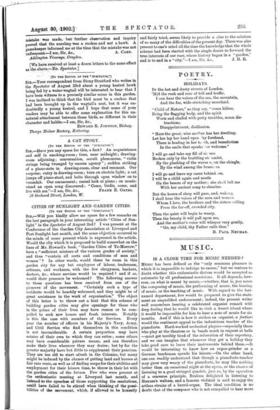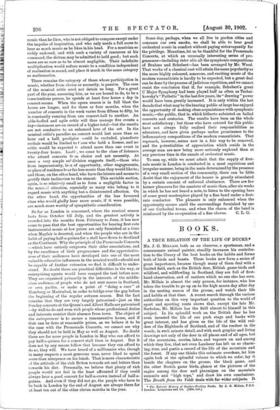MUSIC.
IS A CLOSE TIME FOR MUSIC NEEDED ?
Music has been defined as the "only sensuous pleasure iu which it is impossible to indulge to excess," but we venture to doubt whether this enthusiastic dictum would be accepted as axiomatic by all professional musicians. It all depends, how- ever, on what is meant by music,—whetber, that is, you mean the composing of music, the performing of music, the hearing of music, or the teaching of music. With regard to the last- named department, few would be prepared to give the state- ment an unqualified endorsement; indeed, the present writer well remembers hearing a celebrated organist remark with deep feeling that he would like to visit a desert island where it would be impossible for him to hear a note of music for six months. And if this is how it strikes an organist, a fortiori would the sentiment appeal to the industrious teacher of the pianoforte. Hard-worked orchestral players—especially those who play at the theatres or in bands much in request at balls —must get terribly tired of the reiteration of their repertory, and we can imagine that whenever they get a holiday they take good care to leave their instruments behind them.—It would be interesting to know how an organ-grinder or a German bandsman spends his leisure.—On the other hand, one can readily understand that though a pianoforte-teacher may grow very weary of the pianoforte, he may like nothing better than an occasional night at the opera, or the chance of listening to a good stringed quartet; just as, by the operation of a converse principle, Brahms delighted in listening to Strauss's waltzes, and a famous violinist is said to enjoy the artless strains of a barrel-organ. The ideal condition is no doubt that of the composer who is not compelled to hear more
music than he likes, who is not obliged to compose except under the impulse of inspiration, and who only needs a full score to hear as much music as he likes in his head. For a musician so richly endowed, and with such a variety of resources at his command, the dictum may be admitted to hold good; but such oases are so rare as to be almost negligible. Their indefinite multiplication would reduce music to a condition independent of realisation in sound, and place it much in the same category as mathematics.
There remains the category of those whose participation in music, whether from choice or necessity, is passive. The case of the musical critic need not detain us long. For a great part of the year, assuming him, as we are bound to do, to be a conscientious person, he spends at least four hours a day in concert-rooms. When the opera season is in full blast the hours are longer, and for three or four months, when the number of concerts in the week varies from fifteen to fifty, he is constantly running from one concert-hall to another. An able-bodied and agile critic will thus manage five events a day—instances are on record of a higher total—but the results are not conducive to an enhanced love of the art. In the musical critic's paradise no concert would last more than an hour and a half, prodigies -would be excluded, pianoforte recitals would be limited to r pose who hold a license, and no critic would be expected to attend more than one event in twenty-four hours. Lastly, we come to the class of listeners who attend concerts fr .m choice and not necessity. At once a very simple su1 -division suggests itself,—those who from impecuniosity, of opportunity, other engagements, or place of residence hear far less music than they would like to ; and those, on the other hand, who have the leisure and means to gratify their inclination to the utmost. This enviable section, again, is so relatively small as to form a negligible factor in the musical situation, especially as many who belong to it regard music with anything but a disinterested affection. On the other band, the opportunities of the less favoured class who would gladly hear more music, if it were possible, are much more worthy of sympathetic consideration.
So far as London is concerned, where the musical season lasts from October till July, and the greatest activity is crowded into the months from February to June, it has now come to pass that the best opportunities for hearing first-rate instrumental music at low prices are only furnished at a time when Mayfair is deserted, and when the people who are in the habit of paying half-a-guinea for a stall have flown to Scotland or the Continent. Why the principle of the Promenade Concerts —which have entirely outgrown their older associations, and by the excellence of their programmes and the appreciative- ness of their audiences have developed into one of the most valuable educative influences in the musical world—should not be capable of further extension we find it difficult to under- stand. No doubt there are practical difficulties in the way, or enterprising agents would have essayed the task before now. They are organised primarily in the interests of the middle- class audience, of people who do not rent moors in Scotland, or own yachts, or make a point of " doing a cure " at Homburg or Marienbad, in order to bridge over the gap before the beginning of the regular autumn season. But the fact remains that they are very largely patronised—just as the Sunday concerts at the Queen's and Albert Halls are patronised —by well-to-do and even rich people whose professional duties and interests restrict their absence from town. The object of the entrepreneur is to secure a remunerative house, and if that can be done at reasonable prices, as we believe it to be the case with the Promenade Concerts, we cannot see why they should not be held in May as well as August. No doubt there are far more people in London in May who can afford to pay half-a-guinea for a concert stall than in August. But it does not by any means follow that because they can afford to do so, they will. We have heard of a millionaire who, though
in many respects a most generous man, never liked to spend
more than ninepence on his lunch. That is more characteristic of the attitude of the rich Briton towards art and letters than towards his diet. Personally, we believe that plenty of rich people would not feel in the least affronted if they could always hear a good concert for half-a-crown instead of half-a- guinea. And even if they did not go, the people who have to be back in London by the end of August are always there for at least ten out of the other eleven months in the year.
Some day, perhaps, when we all live in garden cities and consume our own smoke, we shall be able to hear good orchestral music in comfort without paying extravagantly for the privilege. Meantime, let us be thankful for the Promenade Concerts, at which an unusually interesting series of pro- grammes—including inter alia all the symphonic compositions of Brahma and Schubert—has been arranged by Mr. Wood. That works of a classical cast will attain the same popularity as the more highly coloured, sonorous, and exciting music of the modern romanticists is hardly to be expected, but a great deal can be done by the process of judicious repetition, and we cannot resist the conclusion that if, for example, Schubert's great C Major Symphony had been played half as often as Tschai- kowsky's " Pathetic " in the last few years, its " drawing " power would have been greatly increased. It is only within the last decade that what maybe the hearing public at large has enjoyed the opportunity of making close acquaintance with symphonic music,—the public, that is, which hitherto subsisted on ballad concerts and oratorios. The results have been on the whole most satisfactory; but those who have catered for this public have not always fully realised their responsibilities as educators, and have given perhaps undue prominence to the inflammatory compositions of the modern romanticists. That reproach, however, seems now in a fair way to be removed, and the potentialities of appreciation which reside in the average man are now being more seriously explored than at any previous time in the annals of orchestral music.
To sum up, while we must admit that the supply of first- rate music in London is conducted in a most capricious and irregular manner, being in the main determined by the presence of a very small section of the community, there can be little doubt that the enjoyment of the hearer is greatly stimulated by a certain amount of enforced abstinence. There are few keener pleasures for the amateur of music than, after six weeks in which he has not heard a note, to listen to the opening bars of some great masterpiece played by a fine band under a first- rate conductor. The pleasure is only enhanced when the opportunity occurs amid the surroundings furnished by one of our Cathedral towns, and when the charm of the band is reinforced by the co-operation of a fine chorus. C. L. G.







































 Previous page
Previous page